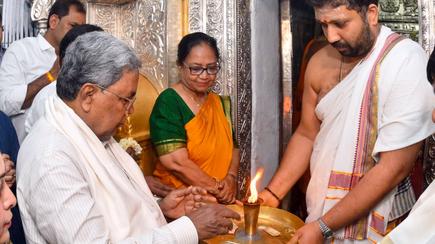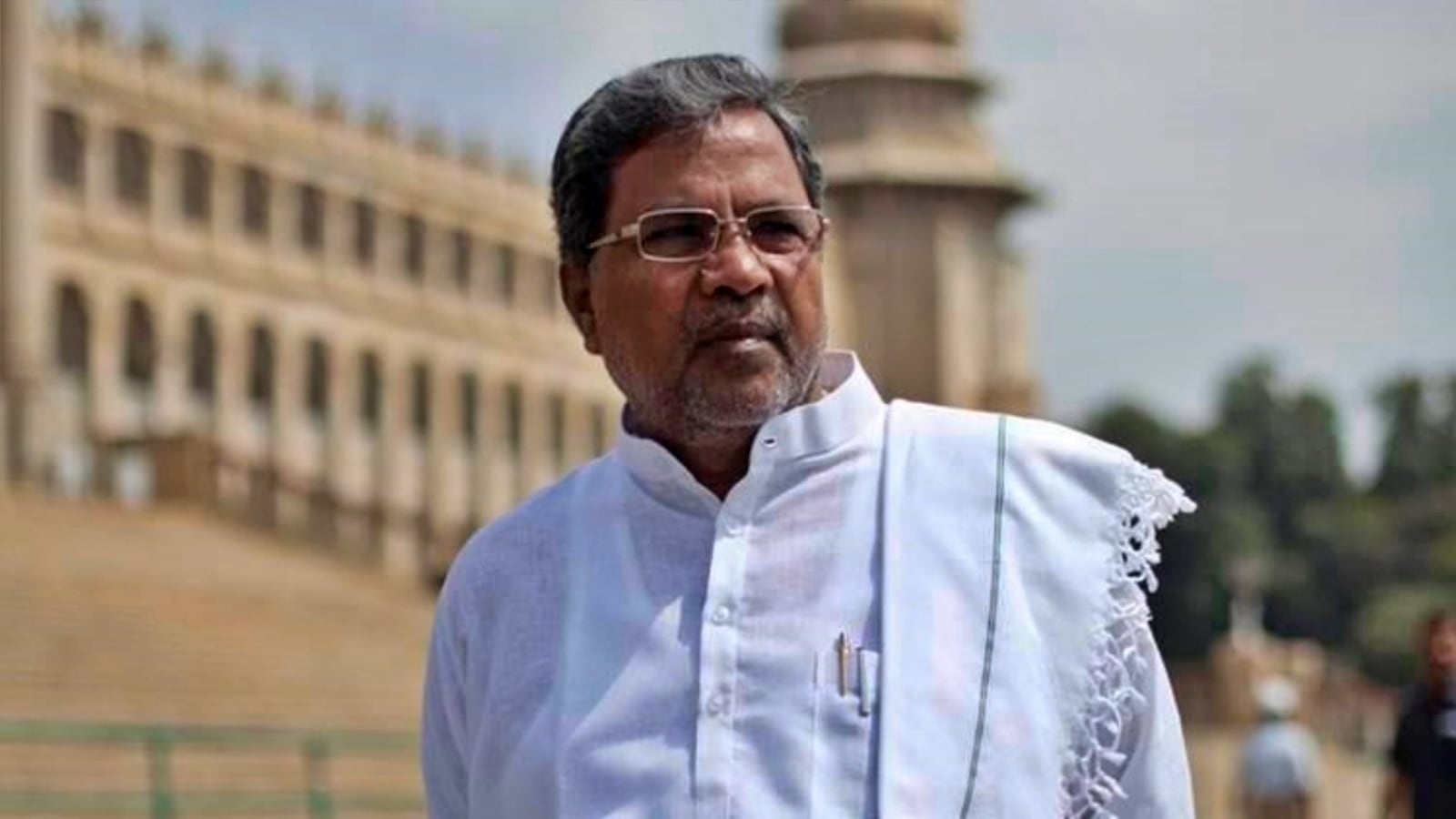Mysuru’s iconic Dasara festival, hailed as Karnataka’s “Nada Habba” or people’s festival, became the focal point of political debate this year. Chief Minister Siddaramaiah firmly addressed opposition criticism about the government’s choice of inviting writer Banu Mushtaq to inaugurate the celebrations. He said politics must remain within the boundaries of elections and should not interfere with cultural traditions that bind communities together. According to him, Dasara is a festival of unity, pride, and heritage, and reducing it to political controversy insults Karnataka’s people and their cultural identity.
The Chief Minister’s remarks came after opposition parties alleged that the decision to include Mushtaq was politically motivated. Siddaramaiah countered, stressing that Karnataka’s festivals must reflect inclusivity and represent everyone, irrespective of religious background. He highlighted how Dasara has always been a stage for showcasing art, music, dance, and literature, bringing lakhs of people to Mysuru each year. Calling it a celebration above politics, he appealed to leaders to preserve the sanctity of the occasion. For the government, choosing Mushtaq symbolized harmony and inclusiveness, which are core values of Karnataka’s society.
Speaking before a crowd of dignitaries, artists, and cultural enthusiasts, Siddaramaiah urged that festivals like Dasara should serve as bridges, not walls. He said leaders who try to turn people against each other during such events risk losing their moral ground. Karnataka, he argued, has a rich history of tolerance and coexistence that should be reflected during state festivals. His words resonated with many attendees, who applauded his reminder that “Nada Habba” is larger than any political rivalry. The atmosphere was one of reassurance, as he called for respect, dignity, and collective pride.

Opposition Reacts with Sharp Criticism
Opposition leaders, however, dismissed Siddaramaiah’s appeal, saying the government itself was responsible for politicizing the festival by inviting Mushtaq. They claimed the move was designed to send a message to particular communities and accused the ruling party of ignoring traditions followed for decades. Some even questioned why the government did not consult cultural leaders before finalizing the guest of honor. These criticisms, though sharp, did not find uniform support among the public, as many citizens felt the opposition was exaggerating the issue. Still, the matter has ignited passionate discussions across Karnataka.
Opposition parties also argued that cultural events must remain free from ideological signaling. They insisted that the government should have chosen someone connected to traditional literature, art, or religious scholarship. The ruling party countered that inclusivity is part of Karnataka’s evolving identity, and the choice of Mushtaq reflects a conscious effort to strengthen inter-community bonds. Analysts noted that the clash mirrors larger political divides in the State, where cultural platforms are increasingly becoming battlegrounds for messaging. For the public, however, the desire remains simple: to celebrate Dasara in peace and joy, without unnecessary controversy.
Within Mysuru, preparations for the grand Dasara procession continued unaffected by the political storm. Elephant rehearsals, cultural rehearsals at the palace, and lighting installations across the city have drawn crowds in large numbers. The mood among participants is festive, and many remarked that they are determined not to let politics overshadow their joy. Volunteers involved in organizing folk troupes, doll displays, and food fairs stressed that for them, Dasara is about people coming together. They urged leaders across the spectrum to respect the work of thousands who contribute to making the festival a success.
Religious leaders, however, struck different tones. Some prominent seers expressed disappointment, saying the government must prioritize tradition over experimentation when it comes to state festivals. They argued that religious customs are central to Dasara’s identity and must be upheld without compromise. Others, however, welcomed the inclusion of diverse figures, saying that Karnataka’s spiritual tradition itself has been rooted in tolerance and dialogue. The mixed reactions highlight the difficulty of balancing heritage with inclusivity, a debate that is likely to continue beyond this year’s festivities.
Political analysts say Siddaramaiah’s statement was both defensive and strategic. By asking opponents to confine politics to elections, he projected himself as a protector of Karnataka’s cultural pride while deflecting criticism. Analysts suggest this messaging could resonate with voters who are fatigued by constant political sparring. However, they also note that opposition parties may continue to exploit cultural issues to question the government’s commitment to tradition. This tug-of-war between heritage and inclusivity, they argue, reflects the larger ideological battle being fought in Karnataka’s political landscape.
Tourism officials have quietly expressed concern about the controversy but remain optimistic that it will not affect turnout. Mysuru Dasara attracts lakhs of visitors every year, including foreign tourists who are drawn to its grandeur and pageantry. Officials believe that the sheer scale of the festival—ranging from the grand palace illumination to cultural performances and processions—will overshadow political noise. However, they also emphasized the need for leaders to show restraint, as repeated controversies could damage Karnataka’s image as a culturally vibrant and welcoming destination in the long run.
Ultimately, the Dasara inauguration controversy has brought to light broader questions about the relationship between politics and culture. Should cultural events remain untouched by political debates, or are they inevitably tied to society’s ideological battles? Siddaramaiah’s call for restraint highlights the desire to preserve the sanctity of festivals, yet opposition criticism underscores concerns about tradition and representation. While the answers may remain contested, what is clear is that the people of Karnataka want to see their festivals celebrated with harmony, pride, and dignity—values that transcend political divides.
Looking Ahead
As Mysuru gears up for the grandeur of processions, cultural performances, and traditions associated with Dasara, the political storm has added a new dimension to the festival. Siddaramaiah’s words—“Do politics during elections, not during Nada Habba”—continue to echo as a reminder of the need for balance between politics and culture. While opposition leaders may persist with criticism, the focus among ordinary citizens remains on ensuring the festivities are celebrated with devotion, enthusiasm, and harmony. For Karnataka, Dasara is not just a cultural event but also a mirror of its unity in diversity.

Many senior Congress leaders echoed Siddaramaiah’s view, arguing that the opposition is deliberately trying to inject negativity into a festival meant to celebrate Karnataka’s identity. They pointed out that Mysuru Dasara has historically been an inclusive platform where rulers, poets, saints, and thinkers of all backgrounds were honored. According to them, the government’s decision to invite Banu Mushtaq is not an exception but a continuation of this legacy. Leaders also argued that such debates distract from pressing governance issues, and festivals should remain a time for unity rather than discord.
On the other hand, Bharatiya Janata Party (BJP) leaders intensified their criticism, accusing the ruling party of disregarding Hindu traditions. They suggested that the invitation extended to Mushtaq was intended to provoke controversy and consolidate certain vote banks. Several BJP spokespersons remarked that while inclusivity is important, it should not come at the cost of heritage or established practices. They called for future inaugurations to be handled by individuals who have deep cultural roots in Karnataka’s traditions, urging the government to respect public sentiment.
Public reaction has been mixed, though a majority seem more invested in enjoying the festivities than participating in political arguments. Many Mysuru residents said they view Dasara as a rare opportunity to celebrate Karnataka’s art, cuisine, and heritage, and do not want the mood dampened by political squabbles. Traders in the city also voiced their concerns, pointing out that such controversies could hurt tourism, which plays a major role in boosting Mysuru’s economy during Dasara season. For them, cultural unity is directly linked to livelihoods.
Cultural experts have added nuance to the debate, reminding leaders that Karnataka’s festivals historically evolved by blending different influences. Scholars cited examples of how Dasara rituals integrated elements of folk traditions, classical music, and even colonial-era practices, shaping a festival that represents pluralism. They argue that inviting contemporary writers or thinkers, regardless of faith, does not diminish tradition but strengthens it by keeping it dynamic. Experts further cautioned that politicizing cultural platforms risks alienating younger generations, who may see these events as outdated if tainted by divisive rhetoric.
Writers and artists from across Karnataka have also spoken in defense of the government’s choice. Many expressed solidarity with Mushtaq, saying that excluding her on religious grounds would have sent a dangerous message. They highlighted how creative voices thrive in diverse environments, and festivals like Dasara should reflect society’s openness. Some went further, accusing the opposition of trying to restrict the definition of culture to narrow boundaries. For these artists, the inauguration controversy is not just about one person but about the freedom of cultural expression.
Banu Mushtaq herself responded to the controversy with measured words, emphasizing that her presence was meant to celebrate Karnataka’s culture rather than stir debate. In a statement to the press, she expressed gratitude for the warm welcome she received in Mysuru and highlighted the importance of festivals as spaces for unity and shared heritage. Mushtaq also urged citizens and political leaders alike to focus on the joy and learning that cultural events provide, rather than fueling division. Her calm and thoughtful approach helped diffuse tension and reinforced the festival’s message of harmony and inclusivity.
Follow: Karnataka Government
Also read: Home | Channel 6 Network – Latest News, Breaking Updates: Politics, Business, Tech & More

